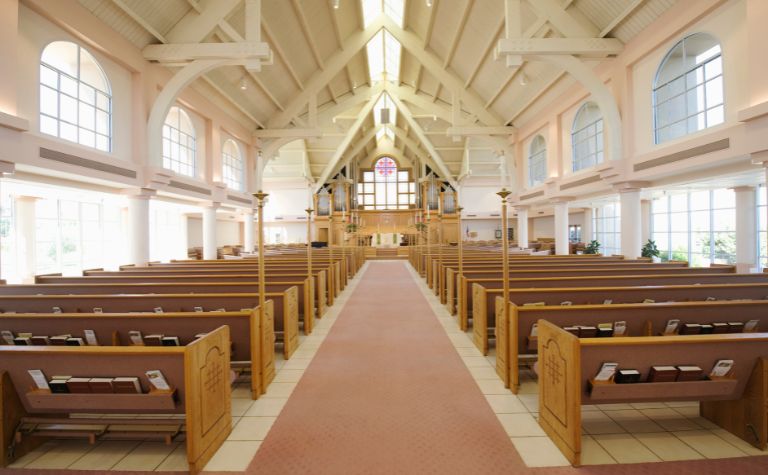Most Christians worship God in churches on Sunday mornings, although a small number gather on Saturday mornings or evenings. Churches have hosted Sunday morning services for 2,000 years. For many followers of Jesus Christ, Sunday mornings at church are foundational to their life, faith, and family. Yet many regular worshipers, and some outside the church, wonder why Christians meet on Sundays.
Christians worship on Sundays because that’s the day of the week that Jesus Christ rose from the dead. There is evidence in the book of Acts that the first Christians met on Sundays. Additionally, church historians teach that Sunday services were commonplace in the first and second centuries after Christ.
When did Christians start worshipping on Sundays? Where does the book of Acts mention Sunday worship? What are some examples of early references to the Lord’s Day in first and second-century Christian writing? Keep reading to learn the answers to these questions and others.
Also see What Is a Lukewarm Christian? to learn more.

When did Christians start worshipping on Sundays?
The significance of Sunday mornings starts with the Gospel accounts of Jesus Christ’s resurrection from the dead. All four Gospels describe his death on Friday and his resurrection on Sunday. The Synoptic Gospels — Matthew, Mark, and Luke — are careful to note that the disciples found Jesus’ tomb empty on the first day of the week, which was Sunday.
- Mark 16:2, “And very early on the first day of the week, when the sun had risen, they went to the tomb.”
- Matthew 28:1, “Now after the Sabbath, toward the dawn of the first day of the week, Mary Magdalene and the other Mary went to see the tomb.”
- Luke 24:1, “But on the first day of the week, at early dawn, they went to the tomb, taking the spices they had prepared.”
In the book of Acts, there is anecdotal evidence that Christians began worshipping on Sundays (more below) to mark the importance of Jesus’ resurrection, the centerpiece of their faith. Historians note that there are even clearer descriptions of Christians meeting on Sundays after the New Testament era.
Renown Christian historian, Kenneth Scott Latourette, writes, “Already in the second century the chief day of worship and the celebration of the Eucharist was Sunday, and the reason given was that it was on this first day of the week, ‘the Lord’s Day,’ that Christ had been raised from the dead.”
Latourette continues, “In choosing that day instead of the Jewish Sabbath (although for centuries even many Gentile Christians also observed the seventh day, or Sabbath) or of Friday, the day their Lord’s crucifixion, Christians were giving further evidence that their faith was primarily in the risen Christ.” [1]
Another New Testament scholar adds, “We do know that the early Christians held their services on Sundays, the first day of the week. They called this ‘the Lord’s Day’ because it was the day that Christ rose from the dead.” [2]
Also see How Did Christianity Spread? to learn more.

Sunday worship in the Book of Acts
During Paul’s seven-day stay in Troas, a harbor city of Mysia, on his third missionary journey, he gathered together with other followers of Jesus on Sunday. Acts 20:7 reads, “On the first day of the week, when we were gathered together to break bread, Paul talked with them, intending to depart on the next day, and he prolonged his speech until midnight.”
Acts scholar Eckhard Schnabel writes, “The community of believers gathered ‘on the first day of the week,’ with Paul planning to leave after sunrise the next day. This was probably a regular meeting of the community rather than an ad hoc gathering because of Paul’s presence in the city.” Regarding whether the first day was Saturday or Sunday, Schnable writes, “a meeting on Sunday seems most plausible.” [3]
Likewise, John Stott quotes the highly-respected New Testament scholar F.F. Bruce in his well-reviewed commentary on the book of Acts. “Professor Bruce is surely right, therefore, that Luke’s reference to ‘the first day of the week,’ i.e. Sunday, ‘is the earliest unambiguous evidence we have for the Christian practice of gathering together for worship on that day.'” [4]
Also see How To Be A Better Christian? to learn more.

Early references to the Lord’s Day in Christian history
Ignatius to the Magnesians 9:1 (2nd century): “If then those who had walked in ancient practices attained unto newness of hope, no longer observing sabbaths but fashioning their lives after the Lord’s day, on which our life also arose through Him and through His death which some men deny — a mystery whereby we attained unto belief, and for this cause we endure patiently, that we may be found disciples of Jesus Christ our only teacher –“
Didache 14:1 (1st century): “And on the Lord’s own day gather yourselves together and break bread and give thanks, first confessing your transgressions, that your sacrifice may be pure.”
Epistle of Barnabas 15:9 (2nd century): “Wherefore also we keep the eighth day for rejoicing, in the which also Jesus rose from the dead, and having been manifested ascended into the heavens.”
Justyn Martyr, First Apology (2nd century): And on the day called Sunday, all who live in cities or in the country gather together to one place, and the memoirs of the apostles or the writings of the prophets are read, as long as time permits; then, when the reader has ceased, the president verbally instructs, and exhorts to the imitation of these good things.
He continues: “But Sunday is the day on which we all hold our common assembly, because it is the first day on which God, having wrought a change in the darkness and matter, made the world; and Jesus Christ our Saviour on the same day rose from the dead. For He was crucified on the day before that of Saturn (Saturday); and on the day after that of Saturn, which is the day of the Sun, having appeared to His apostles and disciples, He taught them these things, which we have submitted to you also for your consideration.”
Also see Why Don’t Christians Celebrate Halloween? to learn more.
References:
[1] A History of Christianity: Beginnings to 1500 by Kenneth Scott Latourette. p. 198-199.
[2] Manners and Customs of the Bible. p. 539.
[3] Acts by Eckhard Schnabel. ZECNT. p. 835.
[4] The Spirit, the Church, and the World: The Message of Acts by John Stott. BST. p. 319.
Related Questions
Jesus Christ taught his followers that the Father sought people who worshiped in Spirit and truth (John 4:24). Since the days of the early church, followers of Jesus have met together weekly, and...
Christian Apologists have been around for 2,000 years. Some of the first followers of Jesus Christ became apologists. What's more, is that there are still Christian apologists today. People can find...
